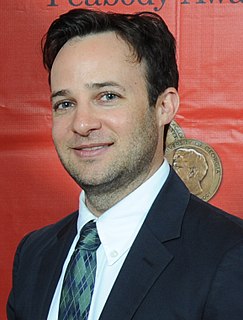A Quote by Charles Bukowski
of one hundred movies there's one that is fair, one that's good and ninety eight that are very bad. most movies start badly and steadily get worse
Related Quotes
I taught everyone a very bad lesson at my publisher because they actually gave me deadlines this time and I'm now meeting them. I used to say, "Here's my book; it's six years late." I'm so much faster now, and work differently. With all the years of writing, I think I still draft as obsessively, but I think back to writing. On your first story, you start at draft one. On your second story, you start at draft ten. On your third story, you start at draft one hundred. If you need a hundred and eight drafts, you may write eight instead of a hundred and eight.
The main thing is to do each project the way you want, and if they find an audience, that's terrific. And if they don't, there's nothing you can do anyway, so don't let it concern you that much. An awful lot of good movies have done badly and an awful lot of bad movies have done very well. There are no real rhymes or reasons for it. Sometimes the stars don't always align right. But if you've done the best you can, you feel pretty good about it.
I guess what I like in my movies is where you see a character change by maybe two degrees as opposed to the traditional movie change of ninety degrees. I guess that always feels false to me in movies because that doesn't truly happen. Around me, at least in the life I live, I guess I don't see people change ninety or a hundred degrees. I see them change in very small increments. I think it's just a monitor I might have on myself as a writer to not make any false scenes.
Steven's Spielberg is one of the most visually talented and character-oriented directors I've ever worked with. And I learn from him every time I watch one of his movies. Good or bad - and he has made some awful movies - they're never uninteresting. He's made four or five of the greatest movies of all time. Perfect movies, like E.T. or Schindler's List or Saving Private Ryan.
Richard Donner made great movies. Seminal movies. The Academy, though, and we have to be careful here, should recognize popular films. Popular films are what make it all work. There was a time when popular movies were commercial movies, and they were good movies, and they had to be good movies. There was no segregation between good independent films and popular movies.
The technology involved in making anything invisible is so infinitely complex that nine hundred and ninety-nine billion, nine hundred and ninety-nine million, nine hundred and ninety-nine thousand, nine hundred and ninety-nine times out of a trillion it is much simpler and more effective just to take the thing away and do without it.
Oddly enough, most of the books written about the subject aren't very good because they just focus on the more hateful movies that they did very early, early on when they were trying to, you know, get Germany into the war, whether it be anti-Semitic movies like "Jud Suss," or "The Eternal Jew," or movies made against the Polish to help, you know, create sympathy for them to invade Poland. You know, there'd be movies where there would be some German girl living in Poland who's raped by the Polish or something.







































